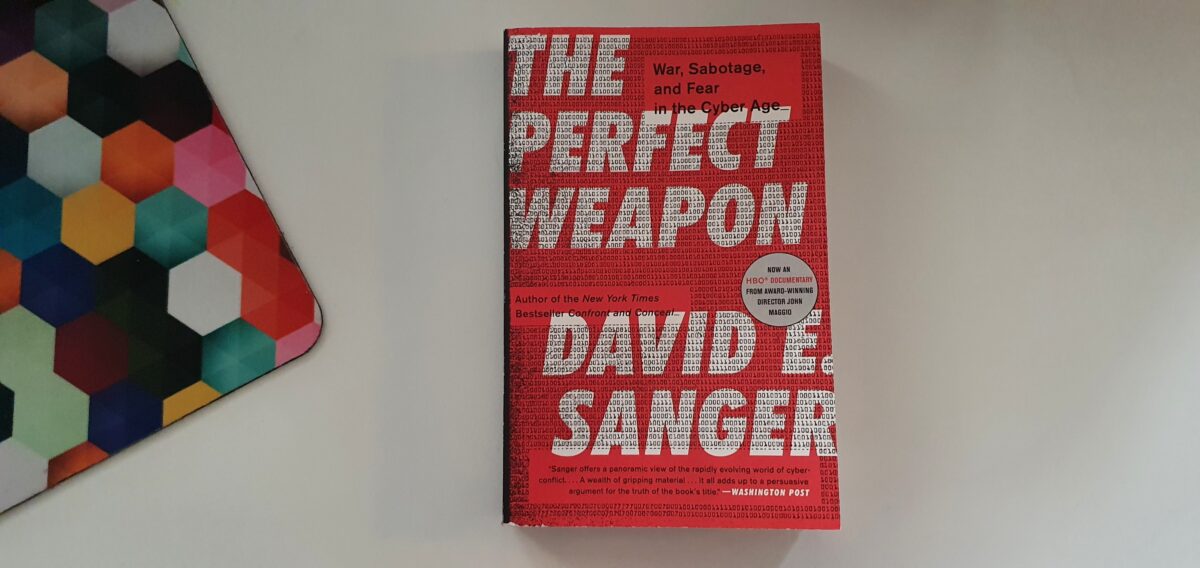The New York Times has journalists (often called reporters, correspondents or writers) devoted to dedicated, limited subjects/topics, such as White House correspondent, lead consumer technology reporter, or national security correspondent, like David E. Sanger. He happens to be a colleague of Nicole Perlroth, author of This is how they tell me the world ends [min egen länk], and this book a kind of sibling. While she covers cybersecurity and digital espionage, he mainly covers national security, and one must read the book with that perspective.
“The Perfect Weapon is the startling inside story of how the rise of cyberweapons transformed geopolitics like nothing since the invention of the atomic bomb” it says on the back cover, and Sanger dives into cyberweapons and their implications on national and international security. American-Israeli Operation Olympic Games is the starting shot of cyberattacks on nation-states about 15 years ago. Preparations of Operation Nitro Zeus, of which I knew nothing previously, was the second, although it was never deployed. In short, Nitro Zeus was supposed to entirely shut down Iran if the US needed to bomb the country in case of attacks on Israel, by infiltrating virtually everything digital in Iran.
Sanger explains some of the cyber warfare infrastructure of the US, such as TAO (Tailored Access Operation) and US Cyber Command, as well as the immense offensive capabilities of the US. Then he explains the infamous (and famous?) Russian hack of the Democratic National Committee is covered, unflattering as it is in his depiction of incompetence, laziness and inertness. Likewise depicted is the very serious hack of the Office of Personnel Management, when China took personal data on approximately 21,5 million American citizens (an astounding amount of personal data on people with security clearance) and 5,6 million fingerprints of important personnel in the US.
Barack Obama managed to accomplish a kind of truce with Xi Jinping after attacks, which lasted until the Trump administration chose trade war with China. In his now famous annual address on New Year’s Eve for 2018, Xi Jinping had two books on artificial intelligence on display, carefully chosen as symbols of ambitions and interests of the Communist party the coming years. Some believe the data stolen from the US is a way to train AI, mapping both people and country.
What the US taught its adversaries through cyberattacks and cyber espionage was how imperative this capability is, at a low cost to boot. North Korea was not a power to be reckoned with before American meddling, but now it is, just like Iran. Instead of limiting attacks and espionage to state organizations, adversaries attack and or spy on civilian (or soft) targets: municipalities, companies, large corporations, journalists, politicians, activists.
Sanger also draws conclusions I have barely encountered before, however logical they are once read, stemming from his focus on national security. In the trove of data Edward Snowden collected and shared with a few chosen people was information on how the National Security Agency (NSA) installed their own equipment in companies’ products (like Cisco). This, not the ways NSA accessed the tech giants’ servers to spy on its own population, was the real important find. This damaged US national security and has had very serious implications in geopolitics. One aspect of this is the trade-technology-war between the US and China. Why would Americans let Chinese companies build infrastructure in the US when they knew exactly what they themselves would do, were they to build infrastructure in China? And why would the Chinese not attempt to build backdoors and make attempts to spy on the Americans at every turn, when it was proven the Americans did exactly this?
Like Perlroth, Sanger concludes that the US is mostly to blame itself. It showed the world cyberweapons are useful. It amassed the most encompassing espionage apparatus ever, with amazing offensive capabilities. But it cannot defend itself. The US is wide open for most attackers.
Since the release of the book, Joe Biden has become president and his administration has showed a much more ambitious approach of beginning to cybersecurity than his predecessors. The administration is deeply engaged in cyber defense and security, making it a priority in the infrastructure bill (cyber is mentioned 319 times in the Infrastructure Investment and Jobs Act), participation in conferences and speeches. The lid is off.
Seldom have I come across a book so outstanding and worthwhile, it’s absolutely teeming with information on cyberweapons and warfare. If you’re to choose one book to read on these topics, it’s The Perfect Weapon. Besides, how could I not like a book with chapter titles like From Russia, With Love and Pandora’s Inbox?
